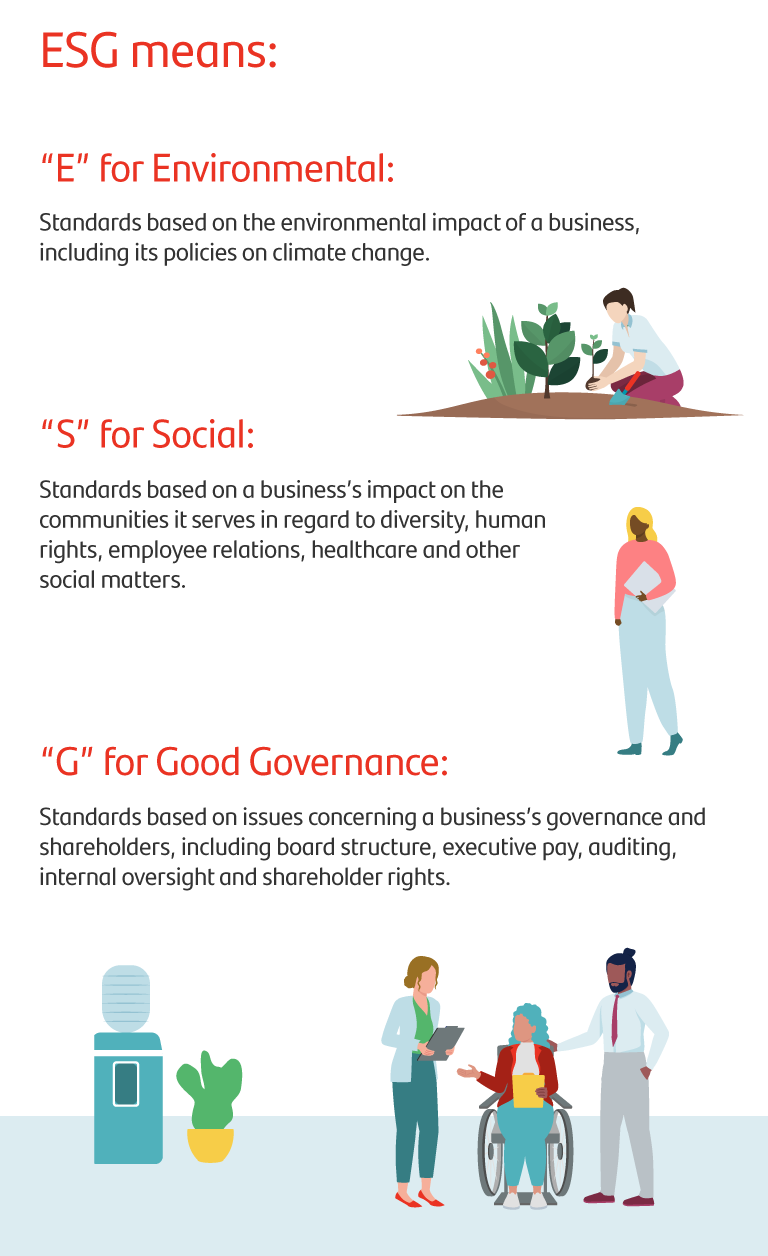What are sustainable finance and ESG?


Last update: 11/07/2023
“Sustainable finance” has been part of the business world for more than twenty years, steadily gaining importance as society strives towards a responsible global economy. In fact, more companies are referring to environmental, social and good governance (“ESG”) standards to make responsible decisions about investment and corporate strategy. Here’s how.
Sustainability is a major challenge affecting both people and businesses. The big question many face is how to help society grow, without worsening global warming, climate change, inequality and discrimination of the vulnerable and underprivileged.
Sustainable finance is part and parcel of a responsible global economy. For society to get where it needs to be, everyone — people, governments and businesses — must work together. Banks know this and have made sustainable finance a top priority to build a prosperous future.

Sustainable finance is all about ethical decision-making in business and investment. It pivots on environmental, social and good governance (ESG) standards (especially in asset management and corporate strategy) that customers, workers and investors demand of companies. Sustainable finance is helping transform both the economy and society with more responsible development and with investment in the transition towards sustainable production and services around the world.
To spot ESG-related risks and rewards in investment, many people refer to ratings like MSCI ESG. MSCI sees global sustainability challenges in regard to sea level rise and flooding, privacy and data security, shifting demographics, regulatory pressure and other things generating new risks that many investors may never have known to exist. ESG standards refer to how companies operate.

Types of sustainable finance
More financial products meet ESG standards and promote social causes, economic growth and sustainable development:
- Sustainable investment funds: Funds that invest your money in ventures aligned with your values and ethics, especially if you care about innovation, energy efficiency and social development.
- Green and social bonds: Debt instruments issued by organizations to fund socially responsible ventures.
- Social venture capital: Investment in companies whose purpose is to solve social and environmental issues. Investors expect returns in the form of profits and sustainability.
- Green loans: Loans to purchase energy-efficient home appliances, low-emissions vehicles and other eco-friendly things.
How to make a sustainable investment?
When you invest in ESG financial products, you need to think about profitability and sustainability in the long term. Make sure whatever you're investing in relates to a venture that aims to have a positive effect on society or the environment. The fund manager you choose should have experience with sustainable investment so you can get the best advice possible. Also, make sure the fund manager has its own standards of ethics, responsible investment and transparency.
Why does investing in sustainable finance matter?
Investing in sustainability is good for the economy, communities and the environment. Banks are transforming to address society’s needs and concerns. For example, initiatives like the Net Zero Banking Alliance (NZBA), where Santander and other banks are helping drive this change and shift their portfolios towards more sustainable products to reach net zero emissions.
The EU and government agencies have reinforced their commitment through policies that are based on fighting climate change and the inclusion of vulnerable groups. Investors concerned with ethics and the environment want their portfolios to include businesses that look out for the planet and all living things. It’s a way for them to drive inclusive, sustainable growth and aid the transition towards a low-carbon economy.
At Santander, our operations, financing and investment keep not only social and environmental risks and rewards in view, but also United Nations’ Sustainable Development Goals to help align the economy with society’s needs.
We offer stakeholders access to our Sustainable finance classification system (SFCS), which tells them if products and services are sustainable, green or socially-conscious.








